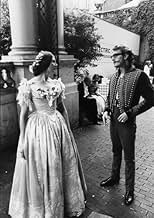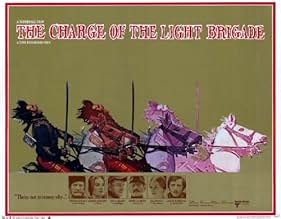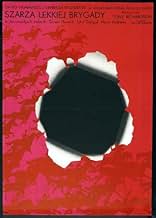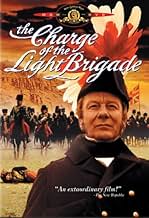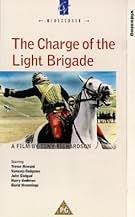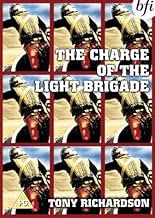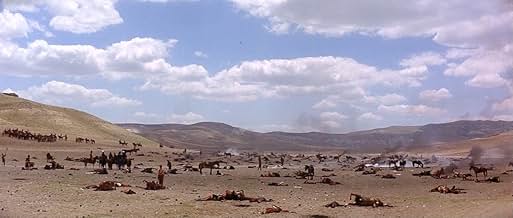AVALIAÇÃO DA IMDb
6,6/10
4,2 mil
SUA AVALIAÇÃO
Adicionar um enredo no seu idiomaIn 1854, during the Crimean War, poor planning leads to the British Light Brigade openly charging a Russian artillery position with tragic consequences.In 1854, during the Crimean War, poor planning leads to the British Light Brigade openly charging a Russian artillery position with tragic consequences.In 1854, during the Crimean War, poor planning leads to the British Light Brigade openly charging a Russian artillery position with tragic consequences.
- Direção
- Roteiristas
- Artistas
- Indicado para 7 prêmios BAFTA
- 7 indicações no total
John J. Carney
- Trooper Mitchell
- (as John Carney)
Howard Marion-Crawford
- Lt. Gen. Sir George Brown
- (as Howard Marion Crawford)
Christopher Cunningham
- Farrier
- (as Chris Cunningham)
- Direção
- Roteiristas
- Elenco e equipe completos
- Produção, bilheteria e muito mais no IMDbPro
Avaliações em destaque
Anyone who is looking for an historically accurate depiction of the charge of the Light Brigade at Balaklava, and the events that preceded it, had best leave this one on the video store shelf. Visually, the movie is well done and the cavalry action scenes are nearly as good as those portrayed in Sergei Bondarchuk's "Waterloo" - despite the fact that Bondarchuk had most of the Russian Army as extras. Unfortunately, director Tony Richardson couldn't make up his mind whether he was making a movie or a social commentary and his indecision pervades the story line from beginning to end. I notice that some other commentators here have praised the film for its accuracy. In reality it was anything but - most of the sub-plots were fabricated and some of the actual battle scenes are either gross distortions of what actually happened or improbable speculations. Captain William Morris (17th. Lancers), for example, was not foppish dilettante soldier portrayed - rather he was a tough, seasoned professional who had attended the Royal Military College, served in three previous campaigns and had taken part in the charge against the Sikh guns at Aliwal, India. Nor did he ride back wounded to the British lines after the charge as the movie would have it - in fact he was so badly wounded that he was left on the battlefield and was rescued much later by two of his comrades, both of whom received the Victoria Cross. And Captain Louis Nolan certainly didn't have an affair with Morris' wife (Vanessa Redgrave) as the plot implies - Nolan had never met Morris before they were both sent to the Crimea.
It was much in vogue to make iconoclastic war movies in the late '60s - "Oh! What a Lovely War", was another - probably because of Vietnam. It's a great pity that Richardson choose 'The Charge of the Light Brigade' as his protest vehicle since it leaves an enduring stain on the memory of 700 very gallant men. Yes, there were 700, not 600 - Tennyson got it wrong.
It was much in vogue to make iconoclastic war movies in the late '60s - "Oh! What a Lovely War", was another - probably because of Vietnam. It's a great pity that Richardson choose 'The Charge of the Light Brigade' as his protest vehicle since it leaves an enduring stain on the memory of 700 very gallant men. Yes, there were 700, not 600 - Tennyson got it wrong.
First, it should be noted that Tony Richardson's "The Charge of the Light Brigade (1968) is not a remake of the Errol Flynn classic adventure film of 1936; rather it is based on the Cecil Woodham-Smith work of military history, "The Reason Why". Both book and film are a debunking of the Tennyson poem. And hard as it is to believe, Richardson's film actually tones down the absurdities of the three principle figures responsible for the debacle at Balaclava. And these three stooges thoroughly deserve the censure of history, for never were the lives of six hundred brave men thrown away more senselessly than with the charge of the Light Brigade.
Richardson depicts the insanity of the Crimean War and Victorian society's glorification of militarism with a death's head sense of humor which makes the horrors of the conflict all the more potent. And he is unsparing in his condemnation of the culture that could glorify so unmitigated a disaster as Balaclava. The film was made at the height of America's involvement in the Vietnam War and it is an implicit critique of that conflict and war in general in that all countries regardless of time and place indulge in the pastime of National Lying. The greater the calamity, the greater the need to lie or glorify, for always the dead must count for something. In that sense the film is universal as well as timeless.
Using animation in the style of the Victorian newspaper caricaturists, during the opening credits, the film quickly details the events that led up to the war. This is also one of the few films to hold the media, in this case the English newspapers of the time, accountable for their actions. Instead of calling for deliberations and a halt to the madness that must inevitably lead to war, the press is shown whipping the British nation into war frenzy. These animated sequences which appear throughout the film to forward the exposition are both wonderfully inventive and wickedly delicious.
Throughout the film which is satiric and misanthropic in tone, the lower classes are shown to be stupid, ugly, and easily led, while the upper classes are shown to be stupid, beautiful, and utterly incapable of leading. Indeed the only decent individuals portrayed are either destroyed or trampled under foot by events and/or the arrogant stupidity of their superiors. Yet Richardson is never judgmental; rather he takes a Kubrickian detached point of view, allowing the viewers to observe the era and its foibles/morals and judge for themselves. And England of the mid-nineteenth century is beautifully recreated here. Hairstyles and uniforms and sets are rendered in exquisite detail. It takes its rightful place along side "Barry Lyndon" and "The Duelists" as among the most successful period recreations.
The film also uses a lot of period colloquialisms such as, "My cherry-bums!" and "All this swish-n-tits has made me randified!" and "You tell that stew-stick of a brother-in-law, that Brudenell to fetch off!" Wonderful, though some first time viewers may have difficulty understanding exactly what has just been expressed. And what a cast! Trevor Howard, Harry Andrews and especially John Gielgud give career topping performances. Gielgud as Lord Raglan, the slightly befuddled commander-in-chief, steals every scene he is in. Aging, tired in mind and body, missing one arm, continuously mistaking the French, ("Our allies, My Lord...") for the enemy, never quite grasping the situation whether in his office or on the field of battle, ("England is pretty, babies are pretty, some table linen is very pretty!") Its a delightful comic turn. And who wouldn't feel sorry for anyone unfortunate enough to be caught between Trevor Howard as the choleric Lord Cardigan, ("The melancholy truth was that his golden head had nothing in it.") and Harry Andrews as the equally bilious Lord Lucan? From the moment we see his saturnine countenance striding up the marble steps of the War Office we know this is a humorless, flint-hearted martinet. Both Lords had a long running personal feud which they quickly placed on an official level as well with unfortunate consequences for the Light Brigade.
David Hemmings and Vanessa Redgrave are the young romantic leads. Hemmings is Captain Lewis Nolan, a forward thinking career officer with very definite ideas how war should be conducted. He has returned to England after service in India to join Cardigan's regiment, and quickly runs afoul of the Lord in the affair of the "Black Bottle". In reality it involved another officer, who Cardigan placed under arrest for serving porter, (it was actually Moselle) when he had given strict orders that only champagne be served at the mess. Nolan the professional is unstinting in his criticisms or the three amateur Lords conduct of the war, and yet he too will play an unwitting part in the final destruction of the Brigade. A man of honor, whose honor however does not prelude having an affair with his best friends wife. Redgrave as the wife is as always, luminescent. The supporting cast sparkles as well. Mark Dignam as General Airey, Raglan's Chief of Staff, ("Speak up Nolan, he's a bit hard of hearing, and that statue doesn't help!") Howard Marion-Crawford as Lt. General Sir George Brown, Peter Bowles as Captain Henry Duberly, Norman Rossington as Sergeant Major Corbett, ("Right foot, straw foot!") and especially Jill Bennett as a lascivious Fanny Duberly all are very effective. This was also one of the last appearances of the great English classical actor, Sir Donald Wolfit, who would die later that year.
Finally enough cannot be said of Charles Wood's wonderful screenplay. With its exquisite use of the period vernacular it does a superb job of combining characters while paring history down to the essential to reconstruct the chain of events that led up to the destruction of the Light Brigade.
Richardson depicts the insanity of the Crimean War and Victorian society's glorification of militarism with a death's head sense of humor which makes the horrors of the conflict all the more potent. And he is unsparing in his condemnation of the culture that could glorify so unmitigated a disaster as Balaclava. The film was made at the height of America's involvement in the Vietnam War and it is an implicit critique of that conflict and war in general in that all countries regardless of time and place indulge in the pastime of National Lying. The greater the calamity, the greater the need to lie or glorify, for always the dead must count for something. In that sense the film is universal as well as timeless.
Using animation in the style of the Victorian newspaper caricaturists, during the opening credits, the film quickly details the events that led up to the war. This is also one of the few films to hold the media, in this case the English newspapers of the time, accountable for their actions. Instead of calling for deliberations and a halt to the madness that must inevitably lead to war, the press is shown whipping the British nation into war frenzy. These animated sequences which appear throughout the film to forward the exposition are both wonderfully inventive and wickedly delicious.
Throughout the film which is satiric and misanthropic in tone, the lower classes are shown to be stupid, ugly, and easily led, while the upper classes are shown to be stupid, beautiful, and utterly incapable of leading. Indeed the only decent individuals portrayed are either destroyed or trampled under foot by events and/or the arrogant stupidity of their superiors. Yet Richardson is never judgmental; rather he takes a Kubrickian detached point of view, allowing the viewers to observe the era and its foibles/morals and judge for themselves. And England of the mid-nineteenth century is beautifully recreated here. Hairstyles and uniforms and sets are rendered in exquisite detail. It takes its rightful place along side "Barry Lyndon" and "The Duelists" as among the most successful period recreations.
The film also uses a lot of period colloquialisms such as, "My cherry-bums!" and "All this swish-n-tits has made me randified!" and "You tell that stew-stick of a brother-in-law, that Brudenell to fetch off!" Wonderful, though some first time viewers may have difficulty understanding exactly what has just been expressed. And what a cast! Trevor Howard, Harry Andrews and especially John Gielgud give career topping performances. Gielgud as Lord Raglan, the slightly befuddled commander-in-chief, steals every scene he is in. Aging, tired in mind and body, missing one arm, continuously mistaking the French, ("Our allies, My Lord...") for the enemy, never quite grasping the situation whether in his office or on the field of battle, ("England is pretty, babies are pretty, some table linen is very pretty!") Its a delightful comic turn. And who wouldn't feel sorry for anyone unfortunate enough to be caught between Trevor Howard as the choleric Lord Cardigan, ("The melancholy truth was that his golden head had nothing in it.") and Harry Andrews as the equally bilious Lord Lucan? From the moment we see his saturnine countenance striding up the marble steps of the War Office we know this is a humorless, flint-hearted martinet. Both Lords had a long running personal feud which they quickly placed on an official level as well with unfortunate consequences for the Light Brigade.
David Hemmings and Vanessa Redgrave are the young romantic leads. Hemmings is Captain Lewis Nolan, a forward thinking career officer with very definite ideas how war should be conducted. He has returned to England after service in India to join Cardigan's regiment, and quickly runs afoul of the Lord in the affair of the "Black Bottle". In reality it involved another officer, who Cardigan placed under arrest for serving porter, (it was actually Moselle) when he had given strict orders that only champagne be served at the mess. Nolan the professional is unstinting in his criticisms or the three amateur Lords conduct of the war, and yet he too will play an unwitting part in the final destruction of the Brigade. A man of honor, whose honor however does not prelude having an affair with his best friends wife. Redgrave as the wife is as always, luminescent. The supporting cast sparkles as well. Mark Dignam as General Airey, Raglan's Chief of Staff, ("Speak up Nolan, he's a bit hard of hearing, and that statue doesn't help!") Howard Marion-Crawford as Lt. General Sir George Brown, Peter Bowles as Captain Henry Duberly, Norman Rossington as Sergeant Major Corbett, ("Right foot, straw foot!") and especially Jill Bennett as a lascivious Fanny Duberly all are very effective. This was also one of the last appearances of the great English classical actor, Sir Donald Wolfit, who would die later that year.
Finally enough cannot be said of Charles Wood's wonderful screenplay. With its exquisite use of the period vernacular it does a superb job of combining characters while paring history down to the essential to reconstruct the chain of events that led up to the destruction of the Light Brigade.
So much of the hard part of making a movie about the Crimean War and those who fought there they got right, it's a shame the film-makers couldn't nail the last 30%.
The reenactment of Victorian society is impeccable. In dress, manner, and speech. The battle scenes, too, are remarkably faithful to the original locations and deployments, given the obvious limitations in budget and pre-CGI effects.
The actors playing they major characters, Raglan (Gielgud), Lucan (Andrews), and Cardigan (Howard) all do an excellent job.
And I actually likes the Punch-style animated cut scenes. There was, after all, no way they could show a fleet of several hundred war ships sailing into the Black Sea. Best not try.
So, the problems:
The charge, a comparatively minor screw-up book-ended by major Allied victories at the battles of the Alma and at Inkerman, was the result of a combination of small oversights, fog of war, and bad luck. So while there is a story to tell here there are no clear cut heroes except for the soldiers themselves, and certainly no villains.
So, to make a movie, you can choose either to change history and make larger than life, cartoon characters based on the exaggerated media reports of the day, and the 1950's book which was something of a anti- Cardigan hit piece, ... or you can play it straight, say "this is what it was like" and try to relate the experience, the esprit-de-corps, and yes, the interpersonal tensions, as raw as possible from the top of the command chain to the bottom.
This movie tries to have it both ways, it's cartoony but only for the intention of scoring cheap anti-war satire (all generals are imbeciles!), rather than to actually make the movie more enjoyable or engaging. When the war gets close and personal, it reverts back to just showing events... realistically, but with little or no emotional investment. The mechanics of the charge itself are done well, though.
And then the movie just ends, way too suddenly.
Now maybe, just maybe, Captain Nolan was supposed to be the "hero", the romantic sub-plot (distracting and totally irrelevant to the movie) seems to suggest it, but instead he just comes across as an impatient, vain, inexperienced know-it-all, a thin and unflattering caricature.
So, worth watching, but in better hands it could have been so much more.
The reenactment of Victorian society is impeccable. In dress, manner, and speech. The battle scenes, too, are remarkably faithful to the original locations and deployments, given the obvious limitations in budget and pre-CGI effects.
The actors playing they major characters, Raglan (Gielgud), Lucan (Andrews), and Cardigan (Howard) all do an excellent job.
And I actually likes the Punch-style animated cut scenes. There was, after all, no way they could show a fleet of several hundred war ships sailing into the Black Sea. Best not try.
So, the problems:
The charge, a comparatively minor screw-up book-ended by major Allied victories at the battles of the Alma and at Inkerman, was the result of a combination of small oversights, fog of war, and bad luck. So while there is a story to tell here there are no clear cut heroes except for the soldiers themselves, and certainly no villains.
So, to make a movie, you can choose either to change history and make larger than life, cartoon characters based on the exaggerated media reports of the day, and the 1950's book which was something of a anti- Cardigan hit piece, ... or you can play it straight, say "this is what it was like" and try to relate the experience, the esprit-de-corps, and yes, the interpersonal tensions, as raw as possible from the top of the command chain to the bottom.
This movie tries to have it both ways, it's cartoony but only for the intention of scoring cheap anti-war satire (all generals are imbeciles!), rather than to actually make the movie more enjoyable or engaging. When the war gets close and personal, it reverts back to just showing events... realistically, but with little or no emotional investment. The mechanics of the charge itself are done well, though.
And then the movie just ends, way too suddenly.
Now maybe, just maybe, Captain Nolan was supposed to be the "hero", the romantic sub-plot (distracting and totally irrelevant to the movie) seems to suggest it, but instead he just comes across as an impatient, vain, inexperienced know-it-all, a thin and unflattering caricature.
So, worth watching, but in better hands it could have been so much more.
I do find it fascinating to come across obscure, almost forgotten films like this with familiar faces and famous actors in it. It was made ca. 1968, and in the true spirit of '68, it is strongly anti-war, anti-military, and anti-establishment, even though it is set in the Victorian era, the height of the Romantic age, when Military valor was largely celebrated. Military life is here portrayed in terms of ranks of men being bullied and brutalized by each successive rank above them, with the biggest, meanest and stupidest ones at the top.
I found it quite interesting to see the famous charge, celebrated in the romantic verses of Tennyson, portrayed in such a matter-of-fact manner as a series of tactical blunders due to bad communication and incompatible personalities among the commanders. These events were supposedly well-researched, and though I am not informed on the subject, I found this version of events very credible. Even with the high level of weapons and communications technology we have today, this sort of thing still happens. It must have been very common in centuries past.
To me, the dialog of this film and its delivery by the actors is its most remarkable feature. Seeing films that depict distant eras, I've often thought that these eras must have not just looked different from what we are used to, but sounded very different as well. If we were suddenly dropped into Victorian England, we wouldn't always understand what was being said or inferred to us. Words, phrases, gestures, facial expressions or body language that would have obvious meaning in that time and place would be strange to us. The language and syntax would, of course, be different, but so would the rhythm, pace, expressive color and accenting of the way people spoke. `Charge of the Light Brigade' does a remarkable job of not just looking, but sounding like a distant place and time. For a viewer who is not educated in antique British expressions and military jargon, as I am not, it makes watching this film a bit challenging, but it's like spending 130 minutes in the Victorian age as a so-called `fly-on-the-wall,' as the British put it. There was more than one line spoken after which I thought `say what?' But that's OK. It doesn't kill you, just encourages you to think a bit. This aspect of the film looks to be well-researched as well, a superb example of a somewhat talky script in which great care is taken with the language and its use by the actors. The script doesn't serve the purpose of an exposition device for the dumbest members of the audience, a very common vice in films, particularly big-money films engineered to alienate as few people as possible. It's an integral part of a design to recreate an unfamiliar time and place, and as such, a bit uncompromising.
I found it quite interesting to see the famous charge, celebrated in the romantic verses of Tennyson, portrayed in such a matter-of-fact manner as a series of tactical blunders due to bad communication and incompatible personalities among the commanders. These events were supposedly well-researched, and though I am not informed on the subject, I found this version of events very credible. Even with the high level of weapons and communications technology we have today, this sort of thing still happens. It must have been very common in centuries past.
To me, the dialog of this film and its delivery by the actors is its most remarkable feature. Seeing films that depict distant eras, I've often thought that these eras must have not just looked different from what we are used to, but sounded very different as well. If we were suddenly dropped into Victorian England, we wouldn't always understand what was being said or inferred to us. Words, phrases, gestures, facial expressions or body language that would have obvious meaning in that time and place would be strange to us. The language and syntax would, of course, be different, but so would the rhythm, pace, expressive color and accenting of the way people spoke. `Charge of the Light Brigade' does a remarkable job of not just looking, but sounding like a distant place and time. For a viewer who is not educated in antique British expressions and military jargon, as I am not, it makes watching this film a bit challenging, but it's like spending 130 minutes in the Victorian age as a so-called `fly-on-the-wall,' as the British put it. There was more than one line spoken after which I thought `say what?' But that's OK. It doesn't kill you, just encourages you to think a bit. This aspect of the film looks to be well-researched as well, a superb example of a somewhat talky script in which great care is taken with the language and its use by the actors. The script doesn't serve the purpose of an exposition device for the dumbest members of the audience, a very common vice in films, particularly big-money films engineered to alienate as few people as possible. It's an integral part of a design to recreate an unfamiliar time and place, and as such, a bit uncompromising.
Let's make it very clear from the outset, this version of The Charge of The Light Brigade is in no way a remake of the Errol Flynn film that Warner Brothers did in 1936. This is a factual account about how several hundred of the best of that generation in the United Kingdom met their deaths in the Crimea.
Great Britain from the end of the Napoleonic Wars until the beginning of World War I was only involved in two formally declared conflicts. Although many British folks will cite various colonial enterprises, the only two major wars the British were involved in were the Crimean War and the Boer War. And it was only the Crimean War which involved them with and against other European powers, in this case Russia.
It all was about propping up the Ottoman Empire and keeping the Russians from getting a hold of Istanbul and an outlet to the Mediterranean Sea for their fleet. The problem was all the powers were woefully unprepared for such a war, British included.
The Charge of the Light Brigade as no other film explores the incredible ineptitude of the British Army at that time. Today it beggars the imagination that field grade officers simply purchased their commissions. It's true though, it's the reason why Lord Raglan, Lord Cardigan, and Lord Lucan a group of Colonel Blimps if there ever were, got in charge of things.
It's how it was done, the high army positions were reserved for their aristocracy. The Duke of Wellington had died in 1852, three years before the Crimean War and the charge. He also purchased his commission back in the day. It was just dumb luck that he happened to be a military genius. Lord Raglan who is played by John Gielgud was an able staff officer for Wellington, but as a strategist was hopelessly out of his depth.
Howewver the main two blunderers were a pair of quarreling in-laws, Lord Cardigan and Lord Lucan played by Trevor Howard and Harry Andrews. They would rather have sent their armies against each other than the Russians.
A lot of the best of that generation died charging the heights of Balaclava that day to get to Sevastapol because of these two mutts. In any kind of system based on merit these two would never have gotten to be sergeants let alone generals.
The Crimean War which basically ended as a stalemate because the Russians were as inept as the British led eventually to reform of the army. That reform came in the first ministry of William Gladstone (1868-1874)and his very able Secretary for War Lord Edward Cardwell who finally got Parliament to abolish purchase commissions and promotions were based on merit after that. Good thing too, because it staggers the imagination to think of the British Army going into World Wars I and II and the Boer War under the old system.
The charge at Balaclava gained its enduring legend through the popular poem of Alfred Lord Tennyson who was smart enough to romanticize the Noble Six Hundred instead of their inept leadership The movie that Errol Flynn and Olivia DeHavilland starred in back in 1936 was a romantic story inspired by that poem.
What Tony Richardson and the cast he directed in 1968 bring you the real story of the charge. It's a graphically accurate account and military historians should love this film.
Great Britain from the end of the Napoleonic Wars until the beginning of World War I was only involved in two formally declared conflicts. Although many British folks will cite various colonial enterprises, the only two major wars the British were involved in were the Crimean War and the Boer War. And it was only the Crimean War which involved them with and against other European powers, in this case Russia.
It all was about propping up the Ottoman Empire and keeping the Russians from getting a hold of Istanbul and an outlet to the Mediterranean Sea for their fleet. The problem was all the powers were woefully unprepared for such a war, British included.
The Charge of the Light Brigade as no other film explores the incredible ineptitude of the British Army at that time. Today it beggars the imagination that field grade officers simply purchased their commissions. It's true though, it's the reason why Lord Raglan, Lord Cardigan, and Lord Lucan a group of Colonel Blimps if there ever were, got in charge of things.
It's how it was done, the high army positions were reserved for their aristocracy. The Duke of Wellington had died in 1852, three years before the Crimean War and the charge. He also purchased his commission back in the day. It was just dumb luck that he happened to be a military genius. Lord Raglan who is played by John Gielgud was an able staff officer for Wellington, but as a strategist was hopelessly out of his depth.
Howewver the main two blunderers were a pair of quarreling in-laws, Lord Cardigan and Lord Lucan played by Trevor Howard and Harry Andrews. They would rather have sent their armies against each other than the Russians.
A lot of the best of that generation died charging the heights of Balaclava that day to get to Sevastapol because of these two mutts. In any kind of system based on merit these two would never have gotten to be sergeants let alone generals.
The Crimean War which basically ended as a stalemate because the Russians were as inept as the British led eventually to reform of the army. That reform came in the first ministry of William Gladstone (1868-1874)and his very able Secretary for War Lord Edward Cardwell who finally got Parliament to abolish purchase commissions and promotions were based on merit after that. Good thing too, because it staggers the imagination to think of the British Army going into World Wars I and II and the Boer War under the old system.
The charge at Balaclava gained its enduring legend through the popular poem of Alfred Lord Tennyson who was smart enough to romanticize the Noble Six Hundred instead of their inept leadership The movie that Errol Flynn and Olivia DeHavilland starred in back in 1936 was a romantic story inspired by that poem.
What Tony Richardson and the cast he directed in 1968 bring you the real story of the charge. It's a graphically accurate account and military historians should love this film.
Você sabia?
- CuriosidadesFilming was immensely problematic. Director Tony Richardson fired a stunt coordinator whose manic swordplay killed several horses. An earthquake destroyed the hotel used by the production. David Hemmings was extremely temperamental on-set. The crew and extras, many of whom were Turkish soldiers, fought verbally and physically with local villagers who resented their incursion into the area. Richardson's strange mixture of perfectionism and historical flippancy grated on both his crew and advisers. While filming the final battle, the soldiers were called away for a NATO war exercise, forcing Richardson to shoot the scene with only a few dozen stuntmen.
- Erros de gravaçãoThe character called Featherstonehaugh (played by Corin Redgrave) has his name pronounced more or less as it is written, with four syllables. An upper-class Englishman of the mid-19th century (or, indeed, today) would pronounce it "Fanshawe".
- Citações
Lord Raglan: It will be a sad day for England when her armies are officered by men who know too well what they are doing - it smacks of murder.
- Cenas durante ou pós-créditosIn the animation over the opening credits, the English lion roars just as "A Woodfall Film" appears onscreen (mimicking Leo the Lion at the start of Metro-Goldwyn-Mayer movies).
- Versões alternativasAlthough the cinema version was complete the 1993 UK video release was cut by 7 secs to edit footage of horse-falls. The 2008 Optimum DVD has the cuts length extended to 14 secs and features the 6 minutes shorter print as mentioned below.
- ConexõesFeatured in Otley, Herói Sem Vocação (1969)
- Trilhas sonorasThe Girl I Left Behind Me
(uncredited)
Traditional
Arranged by Trevor L. Sharpe
Heard before the Battle of the Alma
Principais escolhas
Faça login para avaliar e ver a lista de recomendações personalizadas
- How long is The Charge of the Light Brigade?Fornecido pela Alexa
Detalhes
- Data de lançamento
- País de origem
- Idiomas
- Também conhecido como
- La carga de la brigada ligera
- Locações de filme
- Pecenek, Turquia(charge in the Valley of Death)
- Empresa de produção
- Consulte mais créditos da empresa na IMDbPro
Bilheteria
- Orçamento
- US$ 8.000.000 (estimativa)
- Tempo de duração
- 2 h 19 min(139 min)
- Cor
- Mixagem de som
- Proporção
- 2.35 : 1
Contribua para esta página
Sugerir uma alteração ou adicionar conteúdo ausente


